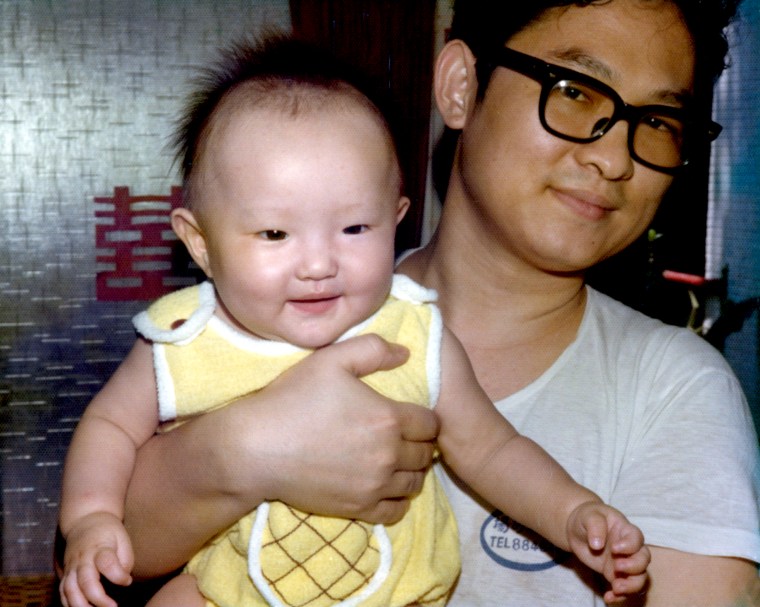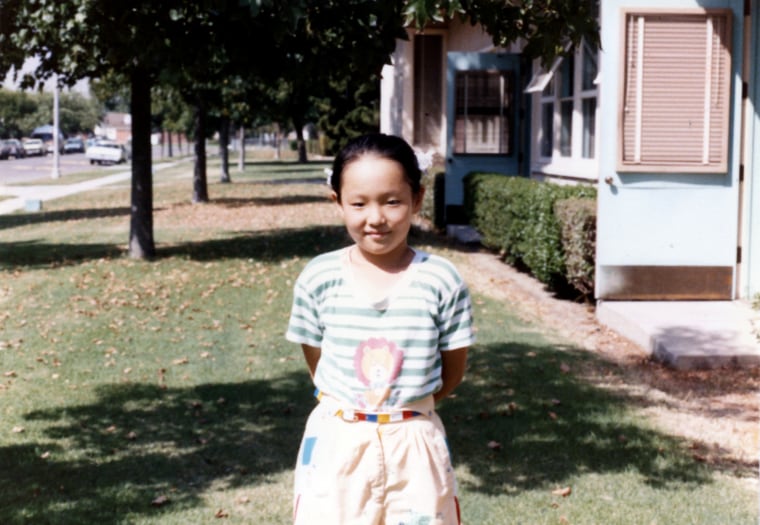On Christmas Day 1984, I tiptoed over to the front door of my house, anxious to see what Santa brought. The night before, I had made paper stockings from notebook paper based on images I’d seen on television. I wrote “Nancy” on one stocking and “Dad” on the other with a blue ballpoint pen, the way I saw American names embroidered on stockings hung on mantles, like on “Silver Spoons.” As an immigrant child, I was fascinated by sitcoms about rich white families — the embodiment of the American dream. I taped the stockings up on the wall next to my front door since we had no fireplace. I figured that if Santa Claus could fly in a magical sleigh pulled by reindeer, he’d find a way inside my house.
But both paper stockings had fallen off the wall and lay flat on the floor. My heart sank. I slid my hands into each of them. Empty. As a desperate final act, I opened the front door, hoping that Santa was waiting outside with his bag full of gifts. But all I let in was a chill that stayed long past that Christmas.
I was 7 years old.
Christmas was a mystery to me. We had not celebrated this holiday in Taiwan, where I was born. So when I immigrated just before first grade, I learned about Christmas from classic stop-motion films like “Rudolph the Red-Nosed Reindeer” and “Santa Claus Is Comin’ To Town,” which aired annually on TV. As a kid who got bullied at school for not speaking English, I related to Rudolph’s woes of being excluded by other reindeers. I desperately wanted to believe in a red-suited jolly old white man who defended isolated reindeers and gave gifts to deserving children.
I threw away the stockings and turned on the television set. “How the Grinch Stole Christmas!” was on. I had never related to a movie so much in my young life. I felt the Grinch’s pain at seeing everyone else’s perfect Christmases with trees and presents and a joy that seemed so out of reach. Why should everyone else have so much holiday bounty when I was so lonely in a new country? But I didn’t blame my father for failing to stuff my stockings. Ba Ba had no clue how to be a single dad, let alone an American dad who played Santa on Christmas. That was just a fantasy on television, not real life. If Santa actually existed, I should be on the top of his list. Not only did I survive my first grade teacher yelling at me on the first day of school because I couldn’t understand English, I became fluent in less than a year. I was the top student in my second grade class. I never complained about getting bullied, even when a classmate took a necklace my mother gifted me when I was just a baby. I was more than good. I was the best.

By the time Christmas came around the next year, I no longer believed in Santa. But when I attended a holiday party with Ba Ba at his new job, my Grinch heart grew three sizes. The party was held in a banquet room decked out in multicolored flashing Christmas lights, silver garlands, colorful tinsel and shiny ornaments. “Jingle Bell Rock” boomed from speakers and couples wearing matching Santa hats and vibrant “ugly” Christmas sweaters danced in the center of the room. I watched them while Ba Ba ate heaping plates of food I’d only ever seen on television: turkey, ham, mashed potatoes, green bean casserole with fried onions and pies for miles. I didn’t even mind that we sat alone and spoke to no one, not even each other. I was content to revel in the Christmas festivities. At the end of the night, there was a raffle. To my delight, Ba Ba won a small portable black and white television/radio and gave it to me.
My very first Christmas gift.
My favorite movie to watch on my new TV was “The Sound of Music,” which came on every December. When my father remarried, more than anything, I wanted just one perfect family day on Christmas even if every other day of the year was dysfunctional. But singing stepmothers like Maria von Trapp didn’t exist in my reality. I spent that Christmas, and many more Christmases afterward, in my room with Christmas movie characters like Jimmy Stewart from “It’s a Wonderful Life,” who taught me it’s OK to be sad on Christmas.
To this day, I struggle with depression during Christmas. But one thing that has helped is a new holiday television tradition: the Christmas romantic comedy. I love how sublime they are in their predictability: the mistletoe and snowball fight as foreplay, a baking competition or Christmas work deadline for tension, and the prize of a gorgeous royal from an imaginary country/small town where it’s perpetually Christmas. And yet, watching them still feels like a lens into another culture, one that is not mine.
Looking back, the exclusion I’ve felt all of my life from Christmas was not only familial but representational as well. Growing up, someone who looked like me never made it into Hollywood’s mostly white vision of Christmas. Asians rarely appeared in Christmas films except as stereotypes, like in “A Christmas Story,” where Chinese restaurant waiters sing “Deck the Halls” in exaggerated racist accents (pronouncing the refrain as “fa ra ra ra ra”). Even now, scanning the websites of the Hallmark Channel and the newer Great American Family channel, it’s clear that Christmas movies continue to have mostly white casts.
But in the last few years, a handful of Asian-led Christmas holiday rom-coms have popped up. “A Sugar & Spice Holiday” on Lifetime, “A Hollywood Christmas” on HBO Max, and Hallmark’s “Boyfriends of Christmas Past,” “Christmas at the Golden Dragon” and “A Big Fat Family Christmas” all feature Asian North American women and their families. Henry Golding (“Last Christmas”) and Jimmy O. Yang (“Love Hard”) play romantic leads in Christmas movies — a rarity in Hollywood. The “Princess Switch” movies starring Vanessa Hudgens have also been sugary treats, especially the third film where Hudgens’ character talked about her Filipina heritage.
While faith, therapy and inclusive Christmas movies have eased my traumas of Christmas past, I started a new tradition this year. I ordered personalized stockings with mine, my husband’s and my children’s baby pictures and names professionally printed. When they arrived, I hung them up immediately on my fireplace. One recent morning, weeks before Christmas, when I ran my hand across the plush new velvet stockings, I gasped. My stocking already had something in it. It was a handmade soap from my kid. My very first stocking stuffer and it was everything I might have felt as a 7-year-old on Christmas morning — wonderment, warmth and joy. Santa comes in all forms.
